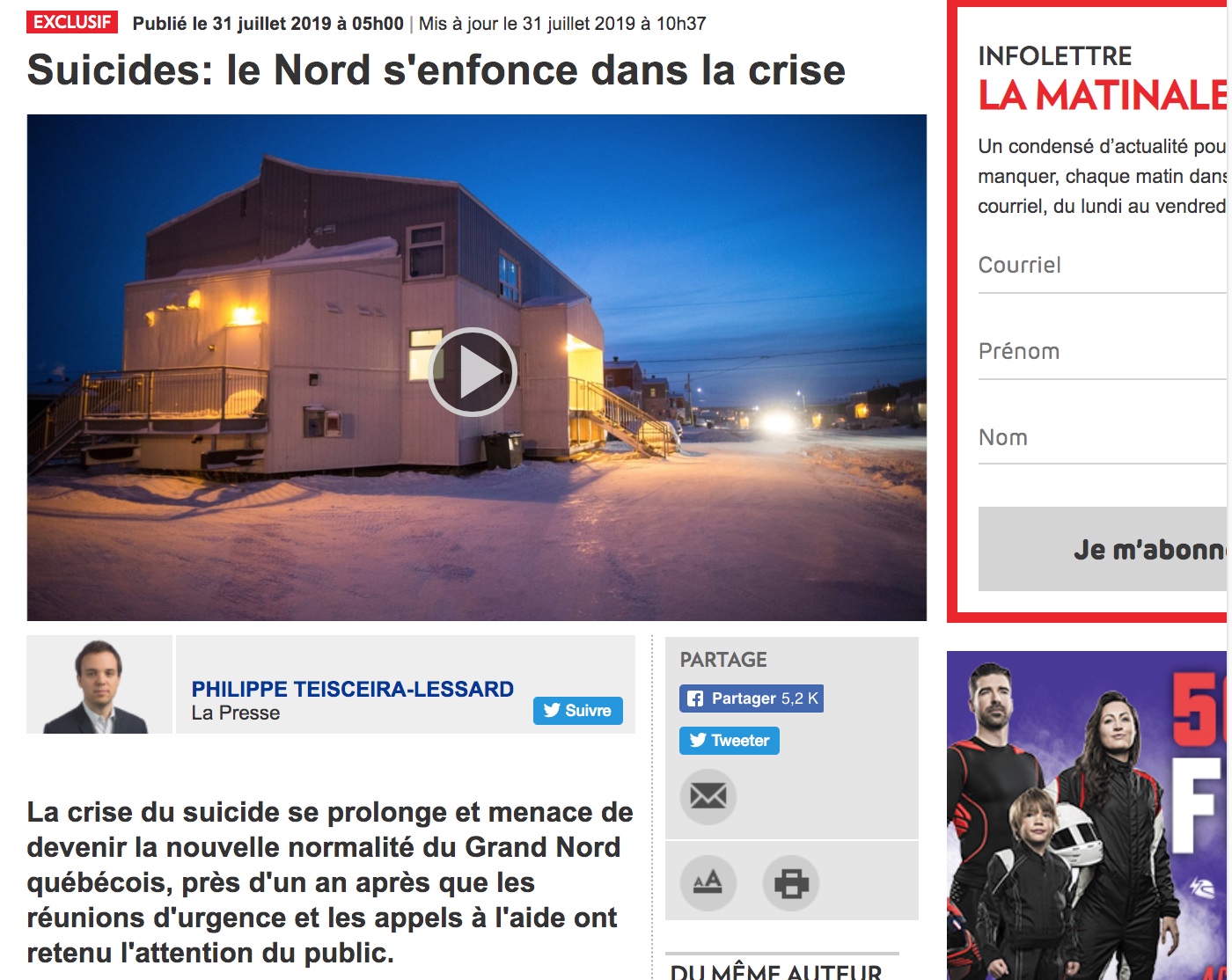Quebec media attention on Nunavik suicide prompts health board reminder
Letter warns of “contagion, media overkill and heightened risks” for suicides
An article in La Presse by Philippe Teisciera-Lessard on July 31 is entitled “Suicide: The North sinks into crisis.” “The suicide crisis continues and risks becoming the new normal in Quebec’s Far North,” reads the subhead. The story appears to have led to a response from Nunavik’s Regional Board of Health and Social Services asking for media “to avoid sensationalism, avoid naming the method used and as much as possible avoid repetitive coverage that risks making such suicide tolerable or social acceptable.” (Screen shot)
Amid growing calls for action on Nunavik’s suicide crisis, the Nunavik Regional Board of Health and Social Services has asked media to be cautious in covering suicide in Nunavik.
The region, with a population of only about 13,000, has experienced 19 deaths by suicide so far this year.
The Aug. 2 letter to media came after a recent article published in the widely read Quebec daily, La Presse, drew attention to a Quebec coroner’s report on a Kuujjuaq woman’s death by suicide in 2018 and provided numbers on recent suicides in Nunavik.
The letter to media said such coverage can lead to “contagion, media overkill and heightened risks” for suicides.
“We understand the interest in this sensitive topic as well as our regions particularities but we must insist on the fact that a certain type of journalist treatment can further burden the most vulnerable among us and foster suicide contagion,” said the letter signed by Minnie Grey, the executive director of the board, and Solène Tanguay, the assistant director general of the Quebec association for suicide prevention.
“It is important to avoid sensationalism, avoid naming the method used and as much as possible avoid repetitive coverage that risks making such suicide tolerable or social acceptable.”
The Quebec coroner’s report cited in the July 31 La Presse story is a public document.
Such coroner’s reports, based on investigations routinely carried out to identify the deceased person, the date and place of death, as well as the causes and circumstances of death, may also be used to make recommendations to prevent further deaths, as they have been in Nunavut.
The coroner’s report cited by La Presse, and obtained by Nunatsiaq News, looked at the death last November of Charlotte Papak, 55, who died in Kuujjuaq on Nov. 15.
According to the report, Papak spent the evening with friends playing bingo. The evening went on as usual although Papak was rather quiet, the report notes.
After Papak’s body was discovered, a farewell letter was found in the right pocket of her jacket. This letter mentioned that no one had forced her to do this, that she didn’t feel loved by anyone and she had nowhere to go.
Papak had recently been evicted from her home because she owed money to the Kativik Municipal Housing Bureau and had been living with family members. She was not known to be depressed, and no one close to her had seen any signs of suicide intention or previous attempts, the report said.
Papak’s was one of 36 suicides in Nunavik last year, La Presse said, citing figures it had obtained: since the start of 2019, there have 19 suicides, including five by children.
Today, Agnès Gruda, of La Presse, who has written about Nunavik on several occasions, called the number of suicides an “epidemic” and “a national tragedy” in an editorial.
Gruda said Quebec must to step up and do something, perhaps by bringing in more resources, accelerating housing construction programs and organizing a major effort among all the parties.
“Allowing Inuit to themselves define the best way to fight suicide doesn’t mean that Quebec should stand passively by. Quebec has the power to send a clear signal that this scourge that is ravaging the North is not acceptable and that it’s ready to take the big steps to fight it,” she said.
That’s similar to what Inuk leader Mary Simon, originally from Nunavik, asked for last year in an online petition that continues to gather support.
Simon’s petition, spurred on by the death of her niece by suicide, asks for Canada and Quebec to “publicly declare the incidence of suicide in northern Quebec a National Crisis and publicly acknowledge that this is contrary to Canadian and Quebec ideals, values and principles, and contrary to the Honor of the Crown.”
Simon asked, as an immediate response, that the prime minister of Canada and the premier of Quebec jointly appoint a special representative “to enact immediate implementation of diagnostic, treatment and counseling programs, for combating these excessive incidents of youth suicide with adequate professionals, facilities, and financial resources, including, but not limited to, addiction facilities and services, employment and training, and educational programs for Inuit of Nunavik.”
The goal of the petition was to gain 65,000 supporters. As of Aug. 8, nearly 61,000 had signed.
If you are in distress and need help, you can reach the following resources:
• Kamatsiaqtut Help Line: 1-800-265-3333
• Crisis line for former residential school students: 1-866-925-4419
• Kids Help Line: 1-800-668-6868 or text 686 868
• Hope for Wellness Help Line: 1-855 242-3310







Congratulations Agnus Gruda of La Presse. Shame on the Nunavik Health Board. This whole story as by this news article highlights the denial within our Nunavik region about the truth of suicide. Within Nunavik, among , what we should be considering a helpful entity is actually an hindrance to well being and suicide prevention. This in my opinion is due to lack of insight, ineffectual desensitized professionals! Plus oversights, and an uneducated approach. This is ridiculous. Anyone reading this are invited to explore further into why there’s such an epidemic, due partially, to not lack of professional help, but lack of competence.
I concur with the previous comment, shame on you hiding behind alleged sensitivity, it is outrageous, there were funerals again this week, I do not believe and please stop the psychologists the issues are emerging from a social ,Mel colonial and historical context, Have your brain trust read the latest statement by psychologists stating that the issues are not rooted in individual mental process ,as the previous comment suggested by your continuous failed attempted you are actually impeding progress and a search for solutions to a complex issue
I’m curious about something, would you say that every time a ‘white person’ makes a claim based on observation (a bit like science) it is ipso facto ‘colonialism’ and therefore not valid? Let’s pursue this question, I think it’s important.
Empirical oberservation itself is rarely not value laden as it claims to be ,iwhat do we choose to observe ,how to we choose to interpret this observation ,how to we measure, empirical. Observation being an expression of colonialism is in my view a simplistic view of what new colonialism is, furthermore it is the interpretation of these observation that lead to theories and explanatory frameworks , that is where the “ colonialism “ might find it s place
I’m not exactly certain what you’re getting at. It’s fair to point out that observations can be tainted by bias, but not all observations are invalid because of this possibility. This is why in the development of theory observations and hypothesis need to be open to the scrutiny of outside observers. If they are sound they should survive intact, if they are not reflective of reality, but of narratives and bias that should be noticed, ideally at least. In this case in particular, we know there is compelling evidence that copy cat suicides and contagion can follow from sensationalism in reporting by the media. To try to discredit this information by labeling it “colonial” is nothing but lazy and parochial.
I was discussing your statement vis a vis empirical knowledge,,I read the response by “ oh my” as implying that neo colonial forces such as governance ,social exclusion ,relevant employment and inappropriate services contribute to the turbulent current social climate, data is not colonial, I think I explained it ,I will leave it at that ,name calling is not my objective, I suggest you explore the Social Determinant Approach to suicide prevention as well as consult some very good literature on this topic by Indigenous and non indigenous authors, I say this in the spirit of a healthy debate.Taima
Fair points, I apologize if I over reacted or seemed rude. I have some interest in the Social Determinant Approach already, I think it’s a promising area for research for sure.
Would people still be attempting to end their life if they knew definitely that their problems go with them, they don’t end with physical death.
What do you think happens after death? I don’t think their problems do go with them. It’s over for them. The tragedy is in the loss of life itself, awareness, consciousness, the capacity to understand and experience beauty, this is an amazing inheritance from the universe. Of course, people suffer greatly in life and can no longer see the magic and beauty. There’s nothing at the end of it all for us, we need to cultivate joy and awe in the present, it’s all we will ever have until we no longer have it. And eventually, none of us will.
I’m not into saying people problems go with them when they die of suicide or die otherwise. That’s a religious aspect built on belief without any proof whatsoever. But I’m resting my case for religious belief, only to say inuit are among the most religious group on the planet, only to have more trouble than most societies, notwithstanding a good old god. I know lots of non religious people who have a better quality life than most believers. Where is he that god? Anyway enough of that, not my favourite subject. I will say religious belief got people in the north more screwed up than anything else, except for alcohol.
An anecdotal observation, but it does seem there is a correlation between misery and ‘belief in magical things, such as god who knows and loves us. I suppose it’s a sort of comfort mechanism, though it is odd how little this being seems to pull through for people and how earnest their fantasies are.
Religion plays a very negative role in inuit life, despite the benefits it offers some people. Yes some get a healthy outlook belief in a higher power, and they have lots of success and happiness. But, those that benefit are not praying for foolishness, they are praying , not even for others, but praying for strength and courage to be a better person, therefore a great assets to others and society. It’s believing in oneself that makes the difference really. This is not what I see in Nunavik. I see unhealthy worshiping, abusing the believing power to yield selfishness and greed. I see too much let go and let be, asking in pray to fix personal issues that are only ours to fix, but being too lazy, thinking god will do it. Suicide is very much manifested into by those unhealthy religious ideology also. Suicide is complicated issue that needs to be rooted down to all these unhealthy ways of living, religion and alcohol have similar results when abused.
I cannot not claim to know what is driving the Boards response, to the article but I find the reasoning. flawed. In Montreal for example individual details on suicides by metro and by jumping off a bridge are not given media attention for the reason the Board put forth , Copycat suicides and cluster suicides are a known phenomenon However there 2 important distinctions,,suicide in Mtl. Is not a Public Health Emergency as it should be considered in Nunavik, , secondly in Nunavik due to it’s small interlinked population news of a suicide travel faster and the population is well aware of it’s occurrence, claiming that an article from La Presse is having a negative impact is in my view somewhat of a stretch that could be viewed as willful ignorance , I however can not claim to know their reasons I hope this can initiate a healthy debate rather than angry exchanges or silence which at times can be quite loud
People in or preparing for rewarding employment seldom commit suicide. They’re seldom murder victims, they seldom disappear, and seldom go to jail.
The foundational problem in Inuit lands is the inadequacy of education and skills training, starting in early childhood. Where are the carpentry and metalwork and engine shops? Where are the school bands? Where are the cross-country ski teams, like the one in Inuvik years ago that provided the core for Canada’s Olympic team?
In Singapore, marginalized Malays got up to speed for the high-tech economy in one generation. That takes intensive schooling, and after-school tutoring like what a middle-class student can get in the South at a Sylvan Learning Center. They can cover an entire year’s high school program in three weeks per subject.
After all this time there should be essentially 100 percent Inuit employment at First Air and Canadian North, in the hospitals and nursing stations, and at all the mines in Nunangat.
In Inuit lands, kids are learning about delinquent behaviour. Living in group homes and foster care. Driving around on skidoo’s and 4 wheelers speeding, unaware of life itself. I feel sorry for those kids that are navigating with good behaviour, they suffer dearly. In Inuit lands kids are not learning about their own culture and traditions, plus not learning in school, and math, science, or anything to prepare them for life. Music program are unheard of in schools, except a few dedicated students who teachers see as having potential against all odds. Kids are out all night long stealing and breaking other people property’s. Kids are out in the streets while their abusive parents are indulging in a joint and drinking away food and rent money. If I could paint, I would paint a sad picture. Then there’s suicide, go wonder.
No need to get defensive. It’s time to get real health workers in place at the health board anyways.
Maybe we should be saying nothing in a defensive way. That would be the most polite Nunavik way. Just pretend everything is fine. Let god take care of it. Surely god would see to it that the Nunavik health board makes changes to health workers, and while god is at it, he may tell people to stop abusive behaviours, like alcohol and sexual abuse. He may even tell people to stop spending food and rent money on booze.
We have a team of 3 amazaing people touring all 14 communities of Nunavik right now. They embrace each community and engage the communities in discussions about anti-suicide, anti-bullying, mental health, life…talking about it makes positive things happen…hiding from it doesn’t make the issues go away!
We use, Magic, Art and Music to get our word and grow awareness. This needs to be on the radar. We are called Influencers Motivating Influencers and can be reached at david.devos@motiv8canada.org if anyone would like to comment directly to me.